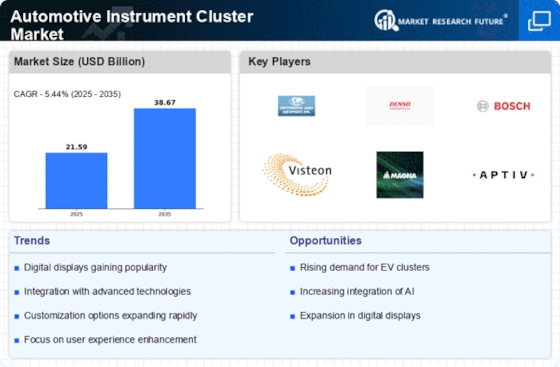Top Industry Leaders in the Automotive Instrument Cluster Market
*Disclaimer: List of key companies in no particular order
Top listed global companies in the Automotive Instrument Cluster industry are:
Continental AG (Germany), Mentor Graphics (U.S), Visteon (U.S), Delphi (U.S), Qualcomm (U.S), Bosch (Germany), Denso (Japan), Alpine Electronics (Japan), Japan Display Inc. (Japan) and Innolux (Taiwan).
Bridging the Gap by Exploring the Competitive Landscape of the Automotive Instrument Cluster Top Players
The automotive instrument cluster market, once a realm of analog dials and gauges, has metamorphosed into a high-tech battleground for digital displays and connectivity. This dynamic landscape is fiercely competitive, driven by rising consumer demand for advanced features, autonomous driving aspirations, and a convergence of automotive and tech giants. Let's delve into the key players, their strategies, and the emerging trends shaping this evolving market.
Established Titans and Their Playbook:
At the forefront stand industry stalwarts like Continental AG, Visteon Corporation, Robert Bosch GmbH, and DENSO Corporation. These established players leverage their extensive experience, R&D prowess, and global reach to maintain a dominant market share. Their strategies revolve around:
Platform-based solutions: Offering modular and scalable platforms cater to diverse vehicle segments and customer requirements, optimizing costs and efficiency.
Strategic partnerships: Collaborating with technology leaders like Google and Qualcomm to integrate advanced displays, operating systems, and connectivity features.
Focus on customization: Providing personalized display layouts and information tailoring, enhancing driver experience and brand differentiation.
Regional Players and Niche Specialists:
While the top tier maintains a stronghold, regional players like Yazaki Corporation, Delphi Automotive LLP, and Calsonic Kansei Corporation are carving out their niches. They capitalize on:
Cost-efficient solutions: Targeting mid-range and budget segments with competitive pricing and simplified functionalities.
Regional expertise: Catering to specific needs and regulatory requirements of emerging markets.
Focus on specific functionalities: Specializing in areas like head-up displays, augmented reality integration, or driver monitoring systems.
Emerging Trends: Where the Market is Heading:
Several new trends are transforming the competitive landscape:
Digital revolution: The shift from analog to full-digital instrument clusters with high-resolution displays, 3D graphics, and customizable layouts is accelerating.
Connectivity and driver assistance: Integration with ADAS (Advanced Driver Assistance Systems) and V2X (Vehicle-to-Everything) communication is becoming crucial, providing real-time information and enhancing safety.
Voice control and AI integration: Advanced voice assistants and AI-powered driver monitoring systems are changing the way drivers interact with their vehicles.
Cybersecurity considerations: With increased connectivity comes the need for robust cybersecurity measures to protect against hacking and data breaches.
The Overall Competitive Scenario:
The automotive instrument cluster market is a complex and dynamic ecosystem. While established players hold sway, new entrants and disruptive technologies are continuously redefining the landscape. Success hinges on adapting to technological advancements, forging strategic partnerships, and catering to evolving consumer preferences. Companies must prioritize innovation, user-centric design, and data security to secure a competitive edge in this rapidly transforming market.
Latest Company Updates:
Continental AG (Germany):
- October 26, 2023: Announced a partnership with LG Display to develop advanced instrument cluster displays with integrated head-up displays (HUDs). (Source: Continental press release)
Mentor Graphics (U.S.):
- September 19, 2023: Released the latest version of its automotive instrument cluster development platform, offering improved performance and scalability. (Source: Mentor Graphics website)
Visteon (U.S.):
- October 31, 2023: Announced a collaboration with Google to integrate Android Automotive OS into its instrument clusters. (Source: Visteon press release)
Qualcomm (U.S.):
- June 20, 2023: Launched its Snapdragon Ride Platform for next-generation in-vehicle computing, including support for advanced instrument clusters. (Source: Qualcomm press release)
Bosch (Germany):
- September 14, 2023: Introduced a new instrument cluster software platform with improved customization and connectivity features. (Source: Bosch website)










